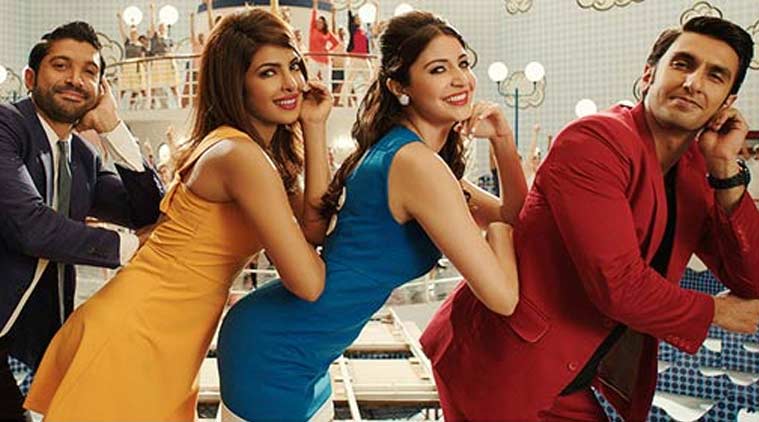Why would a woman whose marriage is a painful farce stay with her husband for 30 long years? Perhaps for the joy of chatting up her son on a luxurious sofa in a beautiful home that resembles a Balinese resort and where a leaf falls noiselessly in a pool. She is Neelam (Shefali Shah) and between mouthfuls of smiles and munchies, she offers to soothe her son Kabir (Ranveer Singh) with a fudge sundae from Narula’s. She has made peace with life and she numbs her pain occasionally by eating too much, dressing up and playing the lady who lunches. It is only when the man of the house, Kamal Mehra (Anil Kapoor) snarls and puts her down repeatedly that the bitterness spills over. Bitterness that she transfers to her unhappily married daughter Ayesha (Priyanka Chopra) by not listening to her marital issues and shutting her down with dismissive one liners like, “All marriages have issues..you have to work through them.”
**
The logic is simple. If she can stay in a loveless marriage, so can her daughter. Sounds familiar? Regardless of the riches that the Mehras flaunt in Zoya Akhtar’s Dil Dhadakne Do, they are no different from scores of Indian families where sons are treated as overgrown babies and daughters as disposable and forgettable commodities. Like a voice-over (by Aamir Khan, incidentally) says, “Beti shaadi ke baad parayi ho jati hai par beta apna hi rehta hai chahe woh kitni bhi shadiyan kar le.” Neelam also represents all the women who after being sacrificed at the altar of tradition have no qualms about using their children to further their social standing. So her daughter must not think of a divorce and her son must be manipulated into a marriage.
**
On the surface, there are no high-points in Dil Dhadakne Do. It is not as textured as Luck By Chance or as invigorating as Zindagi Na Milegi Dobara. The climax with a lifeboat as a metaphor lacks a punch but the film reveals just how messed up family equations can be. And how when you set off claustrophobic impositions against defiance, things become simple and complicated all at once. So countering a gaggle of gossiping wives and suppressed young daughters, is Anushka Sharma’s Farah Ali, a dancer who left her home to realise her dreams, keeps a suitor waiting till she is sure she wants to get to know him, tells him that if he follows the heart, the brain will find a way and then shows him the middle finger when he messes up. Anushka as Farah exudes great integrity and perhaps is the only uncompromised idealist in the film apart from Farhan Akhtar’s Sunny who walks in and out of frames, leaving a whiff of understated rebellion in his wake.
**
It is in the small moments that the film shines. Like the confrontational scene in the hospital room when Kabir pulls a chair to finally have the first honest chat with his family. Watch also how a passive aggressive mother-in-law (Zareena Wahab) interrupts her daughter-in-law repeatedly and is always pretending to be indisposed till she is called out for the joke that she is. And the insensitive sparring between two families around divorce, the way a wife looks longingly at her husband after decking up in her finest saree while he checks his own reflection in the mirror. Of the performances, apart from the obvious set pieces, you have the always faultless Vikrant Massey who should now be cast in a movie of his own. Shefali Shah and Anil Kapoor play off brilliantly against each other.
**
Rahul Bose as the oppressively controlling husband is convincingly loathsome. Ranveer always delivers and there is Priyanka Chopra, always, well turned out even when she is in bed, eating ice cream or crying her eyes out or trying to convince her family that her marriage is not working out with wide, moist eyes and quivering lips. She is subtle and convincing in everything she does except when one is distracted by just how misplaced the vulnerability looks on a face with a perpetual pout and an obviously reshaped nose. Why, you are left wondering, would someone so gifted and strong and beautiful feel the need to change her face to this extent? But we are digressing. Dil Dhadakne Do is not as sharp or witty as Zoya’s other work. But it still has her insight into human nature stamped on it. And it still works as a story about the things that bind us and set us free.
Reema Moudgil works for The New Indian Express, Bangalore, is the author of Perfect Eight, the editor of Chicken Soup for the Soul-Indian Women, an artist, a former RJ and a mother. She dreams of a cottage of her own that opens to a garden and where she can write more books, paint, listen to music and just be silent with her cats.







 with
with